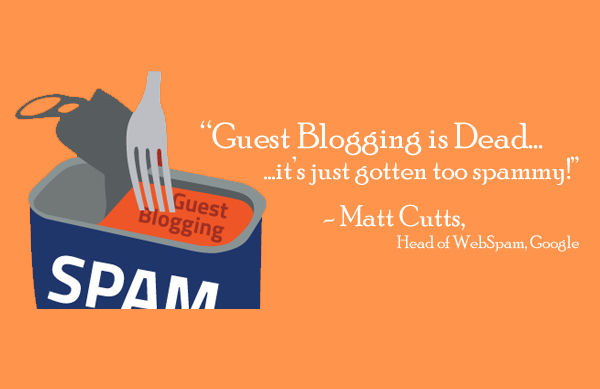Matt Cutts has done it again. On January 20, he once again sent the SEO community into a tailspin with a simple blog post. It was titled, “The Decay and Fall of Guest Blogging for SEO.” In the post, he declared guest blogging for SEO and link building purposes dead.
He wrote, “So stick a fork in it: guest blogging is done; it’s just gotten too spammy. In general I wouldn’t recommend accepting a guest blog post unless you are willing to vouch for someone personally or know them well. Likewise, I wouldn’t recommend relying on guest posting, guest blogging sites, or guest blogging SEO as a linkbuilding strategy.”
Cue the ensuing panic.
The post was cutting (pun intented) and confusing. It left the SEO world scrambling to answer a million questions. Was all guest blogging dead? If you have links from guest blog posts are you in trouble? Do all guest blog links need to be nofollow? What will happen to authoritative sites that rely on guest blogging? What about the well-meaning website owner who uses guest blogging to gain exposure to new audiences?
How Did Guest Blogging for SEO Get A Bad Name?
Guest blogging is a viable marketing strategy. If you seek out authoritative websites and blogs in your niche and you genuinely have something to contribute, it can be a great way to introduce yourself to a wider audience. It’s how Jon Morrow of Copyblogger built his entire business. And it is how many people build an audience, generate sales, and grow their traffic.
But. As with any genuine practice, there are a few (million) bad apples that spoil it for the whole bunch.
Anyone with a fairly visible website has probably gotten guest blogging spam email. These emails are typically mass-mailed requests (often with a pre-written post attached) for space on your blog and a dofollow link to their site. For many companies guest blogging spam has replaced “Canadian Viagra” spam as the most common and the most annoying emails to land in their inboxes.
Said Cutts of this downward trend in his blog post, “Ultimately, this is why we can’t have nice things in the SEO space: a trend starts out as authentic. Then more and more people pile on until only the barest trace of legitimate behavior remains. We’ve reached the point in the downward spiral where people are hawking “guest post outsourcing” and writing articles about “how to automate guest blogging.”
There are entire websites designed to automate your guest posting. Guest blogging is now akin to article marketing. What started out as legitimate, has now become a way of gaming the system.
Is Guest Blogging Dead?
If you’re doing it right, guest blogging is not dead. It is still a perfectly legitimate way to increase your exposure. But if you’re involved in guest blogging strictly for link building purposes, you’d better start focusing your energy elsewhere.
Guest blogging must be done with purpose. It should be part of your larger marketing plan. When done correctly, guest blogging takes a lot of time and effort – it’s not something that can or should be “automated.”
Reasons to guest blog:
- Build community
- Grow exposure in your niche
- Build credibility
- Establish thought leadership
- Increase your traffic
- Branding
The problem with guest posting isn’t the strategy itself. It’s the abuse of the strategy.
We Accept Guest Blog Posts. Are We in Trouble?
As the panic set in about Cutts’ post, he was forced to make a clarification:
“Added: It seems like most people are getting the spirit of what I was trying to say, but I’ll add a bit more context. I’m not trying to throw the baby out with the bath water. There are still many good reasons to do some guest blogging (exposure, branding, increased reach, community, etc.). Those reasons existed way before Google and they’ll continue into the future. And there are absolutely some fantastic, high-quality guest bloggers out there. I changed the title of this post to make it more clear that I’m talking about guest blogging for search engine optimization (SEO) purposes.”
If you accept guest posts, you’re going to want to examine the way you go about it. Think about sites like The Huffington Post, Moz, and Tech Crunch operate. They rely heavily on guest posting, but they have stringent editorial policies. And they post content that is highly relevant to their audience. They don’t just accept posts willy-nilly.
If your website relies on guest posting, you should examine your policies to make sure that your guest posts are adding something to your website and are not simply link dumps for your authors.
A quick checklist for accepting guest posts:
- Reserve the right to reject any and all posts.
- Run everything through Copyscape to ensure the content is original.
- Check up on the author to make sure she is a real person. Does she have an active Google Plus profile? Does she exist anywhere other than your inbox?
- Scan your blog to see if the author is already active in your community.
- Double check all links within the post to make sure they are legit.
- Limit the number of links the author can include.
- Do not allow the author to post affiliate links.
- Make sure you use nofollow links as specified by Google’s guidelines.
This is not a complete checklist, but it’s a good starting point to ensure you develop strong guest blogging policies that won’t anger the Google Gods.
Guest Posting Is Part of Our Marketing Plan for 2014. Should We Drop it?
Not necessarily. Just as websites that accept guest posts are not necessarily in trouble, neither are guest posters who use the tactic strategically, and for a purpose other than link building.
In order to get the most out of guest blogging:
- Target blogs that produce quality content about your industry. You only want to post on influential, authoritative sites.
- Establish a relationship with the blog owner. Are you connected on social media? Follow them and interact (without stalking or spamming).
- Comment on other blog posts. Make sure your posts are insightful and add to the conversation. Don’t just say, “Great post, Bob!”
- Don’t send a pitch email until the blog owner has “noticed you.” They may have followed you back on social media or replied to one of your posts. This means they may remember your name when you send your query. However, some blog owners never interact with followers or commenters. If you are familiar with the blog, you’ll know which type of blog owner they are. If they never reply to anyone, don’t wait for a response.
- When you pitch a post, make sure you’ve got ideas ready. Don’t just say, “I want to post for you, Susan.” Make sure your query includes several ideas, not just one.
- Make sure your ideas are in line with the positions and types of content the site produces. You wouldn’t want to post a piece touting the economic policies of President Obama on a website geared toward ultra-conservatives, for example.
- Call yourself an “expert contributor” rather than a “guest blogger.”
- Don’t post for the purpose of links.
So Is Guest Blogging Dead?
The truth is, guest blogging for SEO died a long time ago. Way back in 2012, Google warned of spammy guest blogging tactics. And they’ve been refining that statement ever since. This declaration by Cutts is frankly a bit of restating the obvious. Many SEO companies dropped guest blogging as a tactic well over a year ago when it became apparent the SEO guest blogging world was being overtaken by junk.
Guest blogging is still a perfectly legitimate marketing strategy, however. When done with genuine thought and purpose, it can help you organically grow your audience and community.
What do you think about the guest blogging dust-up? Tell us what you think about this declaration in the comments.

